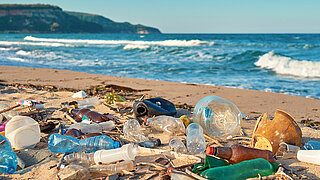Copyright: iStockPhoto / Andi Edwards
BMUV supports the establishment of a recycling company in Egypt for sustainable tourism
To prevent litter from entering the sea, the Federal Ministry for the Environment (BMUV) is supporting the Prevention of Tourism Marine Litter – TouMaLi, a project based in Egypt. The project collects waste in hotels and other tourist facilities, sets up a collection point for waste and markets recyclable materials. In the initial phase, litter will be collected from 20 hotels and at 5 beaches and transported to the recycling centre. In addition, main sources of marine litter in tourism destinations on the Mediterranean coast of Egypt, Tunisia and Morocco are going to be studied and qualified. The aim is to develop sustainable solutions such as legal framework conditions, organisational structures or financing instruments in the North African target countries. The BMUV is supporting the project as the first project in Africa against marine litter. The BMUV made the announcement on the sidelines of an international conference in Alexandria.
The TouMaLi Egypt Company will provide waste management services to the tourism sector in Alexandria and beyond. This will include a pilot project for the collection of recyclables and a recycling yard. Besides the BMUV, the Egyptian Ministry of Environment is supporting the project. In addition to cooperation with producers and hotels, one focus will be on strengthening the so-called informal sector: Individuals will also be involved who have so far collected waste without protection or registration as an additional source of income. This makes the company unique in the North African tourism region and could become a model for more producer liability nationwide. In the medium term, an expansion to Tunisia and Morocco is conceivable.
In addition, the TouMaLi Egypt Company will act as a Producer Responsibility Organisation (PRO) and test the EPR system for packaging in Egypt. EPR stands for Extended Producer Responsibility. With an EPR system, producers of packaging are held accountable through a mostly graduated fee system for packaging that is well or not so well recyclable, so that they pay for the costs of recycling sometimes up to beach clean-up costs. A positive side effect can also be that producers adapt their product design to further recyclability.
Initially, some private Egyptian companies from the hotel, catering and café sector (HoReCa), the Arab Academy of Sciences and the Landbell Group are involved in the company. The Egyptian Ministry of Environment supports the company as a partner of the TouMaLi project within the framework of an Advisory Group. The costs for the company's service are shared among the stakeholders involved (producers and stakeholders from the HoReCa sector together with the Egyptian Ministry of Environment). In order to improve the protection of the oceans against littering, the German Federal Ministry for the Environment (BMUV) has launched the funding programme against marine litter "Marine Debris Framework- Regional hubs around the globe" (Marine:DeFRAG)" in 2019. The projects intend to help establish environmentally sound disposal and recycling structures in countries of the Global South and actively prevent waste. Zukunft – Umwelt – Gesellschaft (ZUG) gGmbH is a federally owned service company founded by the BMUV. It supports the BMUV as project executing agency in the implementation of Marine: DeFRAG and other funding programmes.
From 10 to 11 October, representatives of international organisations, including the BMUV, the ZUG and the Egyptian Ministry of Environment met at a conference in Alexandria. The aim of the conference, entitled "Contribution of sound waste management systems to sustainable tourism and the protection of marine ecosystems", was to present and discuss the initial results of the BMUV's first Africa project "Prevention of Tourism Marine Litter" (TouMaLi), which has been running since the beginning of 2021. In addition, the event facilitated a direct exchange between relevant stakeholders from science, the private sector and politics in the project countries and Europe. The focus was on topics such as Extended Producer Responsibility (EPR) in North Africa.


